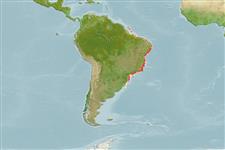Classification / Names
Noms communs | Synonymes | Catalog of Fishes(Genre, Espèce) | ITIS | CoL | WoRMS | Cloffa
>
Blenniiformes (Blennies) >
Labrisomidae (Labrisomids)
Etymology: Paraclinus: Greek, para = the side of + Greek, klinein, kline = sloping and bed, due to the four apophyses of sphenoid bone (Ref. 45335).
More on author: Starks.
Environment: milieu / climate zone / depth range / distribution range
Écologie
marin récifal; profondeur 0 - 25 m (Ref. 43114). Tropical
Southwest Atlantic: Brazil.
Taille / Poids / Âge
Maturity: Lm ? range ? - ? cm
Max length : 4.7 cm SL mâle / non sexé; (Ref. 43114)
Épines dorsales (Total) : 28 - 30; Épines anales: 2; Rayons mous anaux: 15 - 18. Dorsal fin typically with 29 spines followed by a segmented element. Opercular spine ending in a complex of 3-8 spines (in specimens > 16.6 mm SL). Anal fin typically with 17 soft rays (Ref. 43114).
Inhabits clear water, on reefs heavily covered by algae. Usually from shallow environments, but reported from depths of 14 to 23 m (Ref. 43114).
Life cycle and mating behavior
Maturité | Reproduction | Frai | Œufs | Fécondité | Larves
Guimarães, R.Z.P. and A.C.L.H. de Bacellar, 2002. Review of the Brazilian species of Paraclinus (Teleostei: Labrisomidae), with descriptions of two new species and revalidation of Paraclinus rubicundus (Starks). Copeia 2002(2):419-427. (Ref. 43114)
Statut dans la liste rouge de l'IUCN (Ref. 130435: Version 2024-2)
Menace pour l'homme
Harmless
Utilisations par l'homme
Outils
Articles particuliers
Télécharger en XML
Sources Internet
Estimates based on models
Preferred temperature (Ref.
123201): 22.5 - 27.6, mean 27.4 °C (based on 114 cells).
Phylogenetic diversity index (Ref.
82804): PD
50 = 0.5000 [Uniqueness, from 0.5 = low to 2.0 = high].
Bayesian length-weight: a=0.00933 (0.00410 - 0.02122), b=3.10 (2.91 - 3.29), in cm total length, based on LWR estimates for this (Sub)family-body shape (Ref.
93245).
Niveau trophique (Ref.
69278): 3.5 ±0.4 se; based on size and trophs of closest relatives
Fishing Vulnerability (Ref.
59153): Low vulnerability (10 of 100).
